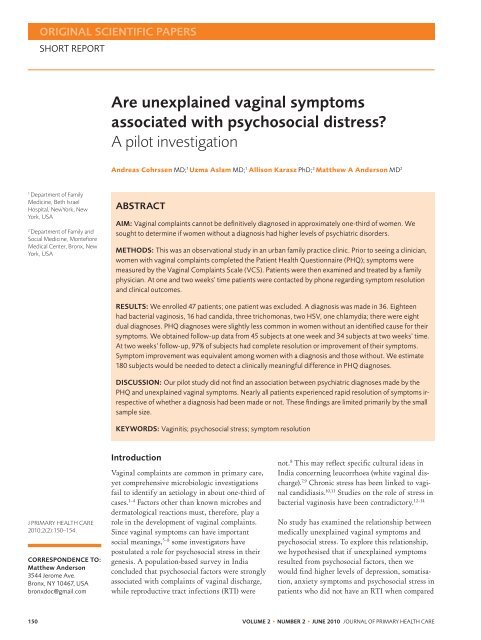entire issue - The Royal New Zealand College of General Practitioners
entire issue - The Royal New Zealand College of General Practitioners
entire issue - The Royal New Zealand College of General Practitioners
You also want an ePaper? Increase the reach of your titles
YUMPU automatically turns print PDFs into web optimized ePapers that Google loves.
ORIGINAL SCIENTIFIC PAPERS<br />
short report<br />
Are unexplained vaginal symptoms<br />
associated with psychosocial distress?<br />
A pilot investigation<br />
Andreas Cohrssen MD; 1 Uzma Aslam MD; 1 Allison Karasz PhD; 2 Matthew A Anderson MD 2<br />
1<br />
Department <strong>of</strong> Family<br />
Medicine, Beth Israel<br />
Hospital, <strong>New</strong>York, <strong>New</strong><br />
York, USA<br />
2<br />
Department <strong>of</strong> Family and<br />
Social Medicine, Montefiore<br />
Medical Center, Bronx, <strong>New</strong><br />
York, USA<br />
ABSTRACT<br />
Aim: Vaginal complaints cannot be definitively diagnosed in approximately one-third <strong>of</strong> women. We<br />
sought to determine if women without a diagnosis had higher levels <strong>of</strong> psychiatric disorders.<br />
Methods: This was an observational study in an urban family practice clinic. Prior to seeing a clinician,<br />
women with vaginal complaints completed the Patient Health Questionnaire (PHQ); symptoms were<br />
measured by the Vaginal Complaints Scale (VCS). Patients were then examined and treated by a family<br />
physician. At one and two weeks’ time patients were contacted by phone regarding symptom resolution<br />
and clinical outcomes.<br />
Results: We enrolled 47 patients; one patient was excluded. A diagnosis was made in 36. Eighteen<br />
had bacterial vaginosis, 16 had candida, three trichomonas, two HSV, one chlamydia; there were eight<br />
dual diagnoses. PHQ diagnoses were slightly less common in women without an identified cause for their<br />
symptoms. We obtained follow-up data from 45 subjects at one week and 34 subjects at two weeks’ time.<br />
At two weeks’ follow-up, 97% <strong>of</strong> subjects had complete resolution or improvement <strong>of</strong> their symptoms.<br />
Symptom improvement was equivalent among women with a diagnosis and those without. We estimate<br />
180 subjects would be needed to detect a clinically meaningful difference in PHQ diagnoses.<br />
Discussion: Our pilot study did not find an association between psychiatric diagnoses made by the<br />
PHQ and unexplained vaginal symptoms. Nearly all patients experienced rapid resolution <strong>of</strong> symptoms irrespective<br />
<strong>of</strong> whether a diagnosis had been made or not. <strong>The</strong>se findings are limited primarily by the small<br />
sample size.<br />
Keywords: Vaginitis; psychosocial stress; symptom resolution<br />
J PRIMARY HEALTH CARE<br />
2010;2(2):150–154.<br />
Correspondence to:<br />
Matthew Anderson<br />
3544 Jerome Ave.<br />
Bronx, NY 10467, USA<br />
bronxdoc@gmail.com<br />
Introduction<br />
Vaginal complaints are common in primary care,<br />
yet comprehensive microbiologic investigations<br />
fail to identify an aetiology in about one-third <strong>of</strong><br />
cases. 1–4 Factors other than known microbes and<br />
dermatological reactions must, therefore, play a<br />
role in the development <strong>of</strong> vaginal complaints.<br />
Since vaginal symptoms can have important<br />
social meanings, 5–8 some investigators have<br />
postulated a role for psychosocial stress in their<br />
genesis. A population-based survey in India<br />
concluded that psychosocial factors were strongly<br />
associated with complaints <strong>of</strong> vaginal discharge,<br />
while reproductive tract infections (RTI) were<br />
not. 8 This may reflect specific cultural ideas in<br />
India concerning leucorrhoea (white vaginal discharge).<br />
7,9 Chronic stress has been linked to vaginal<br />
candidiasis. 10,11 Studies on the role <strong>of</strong> stress in<br />
bacterial vaginosis have been contradictory. 12–14<br />
No study has examined the relationship between<br />
medically unexplained vaginal symptoms and<br />
psychosocial stress. To explore this relationship,<br />
we hypothesised that if unexplained symptoms<br />
resulted from psychosocial factors, then we<br />
would find higher levels <strong>of</strong> depression, somatisation,<br />
anxiety symptoms and psychosocial stress in<br />
patients who did not have an RTI when compared<br />
150 VOLUME 2 • NUMBER 2 • JUNE 2010 J OURNAL OF PRIMARY HEALTH CARE

















